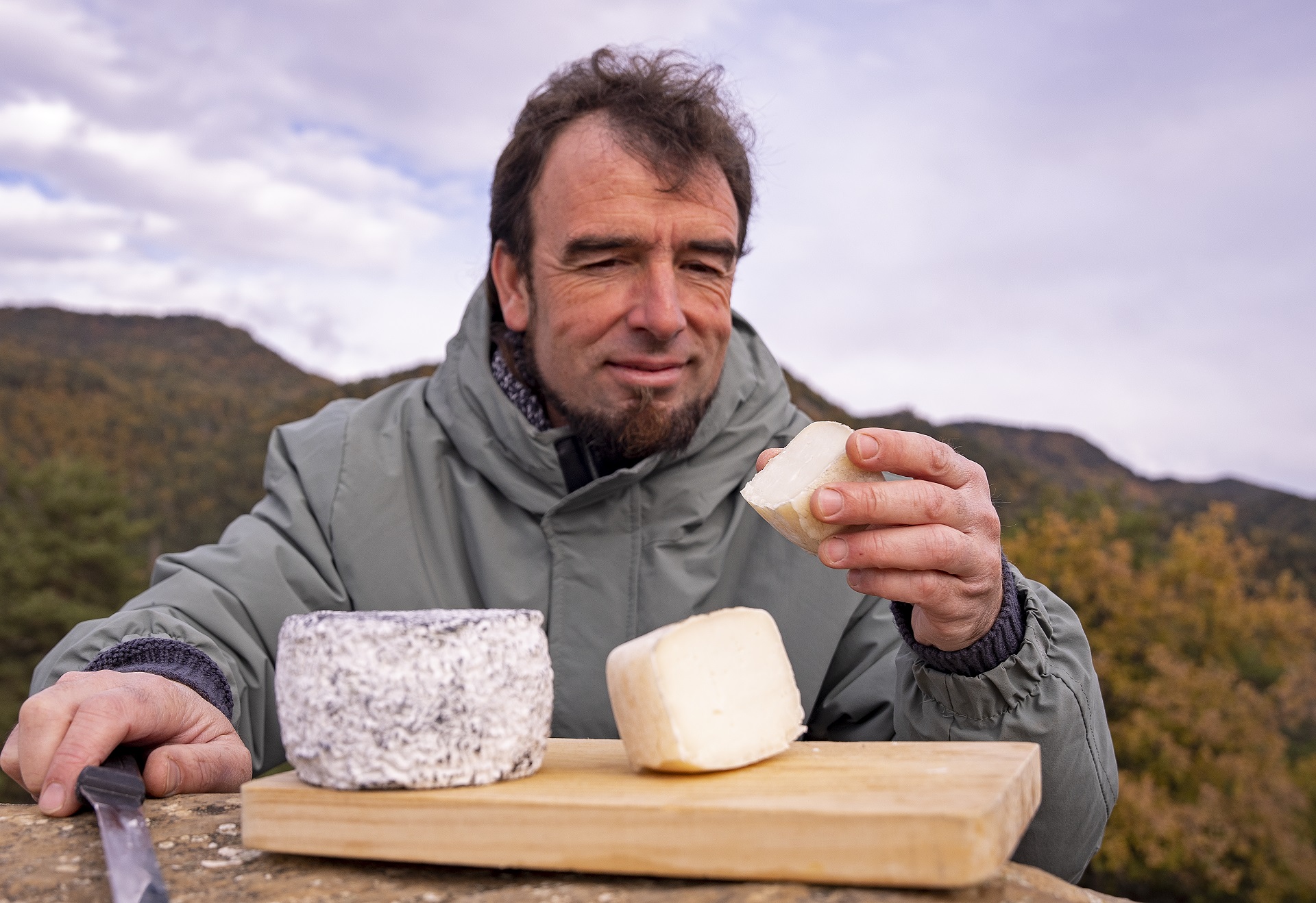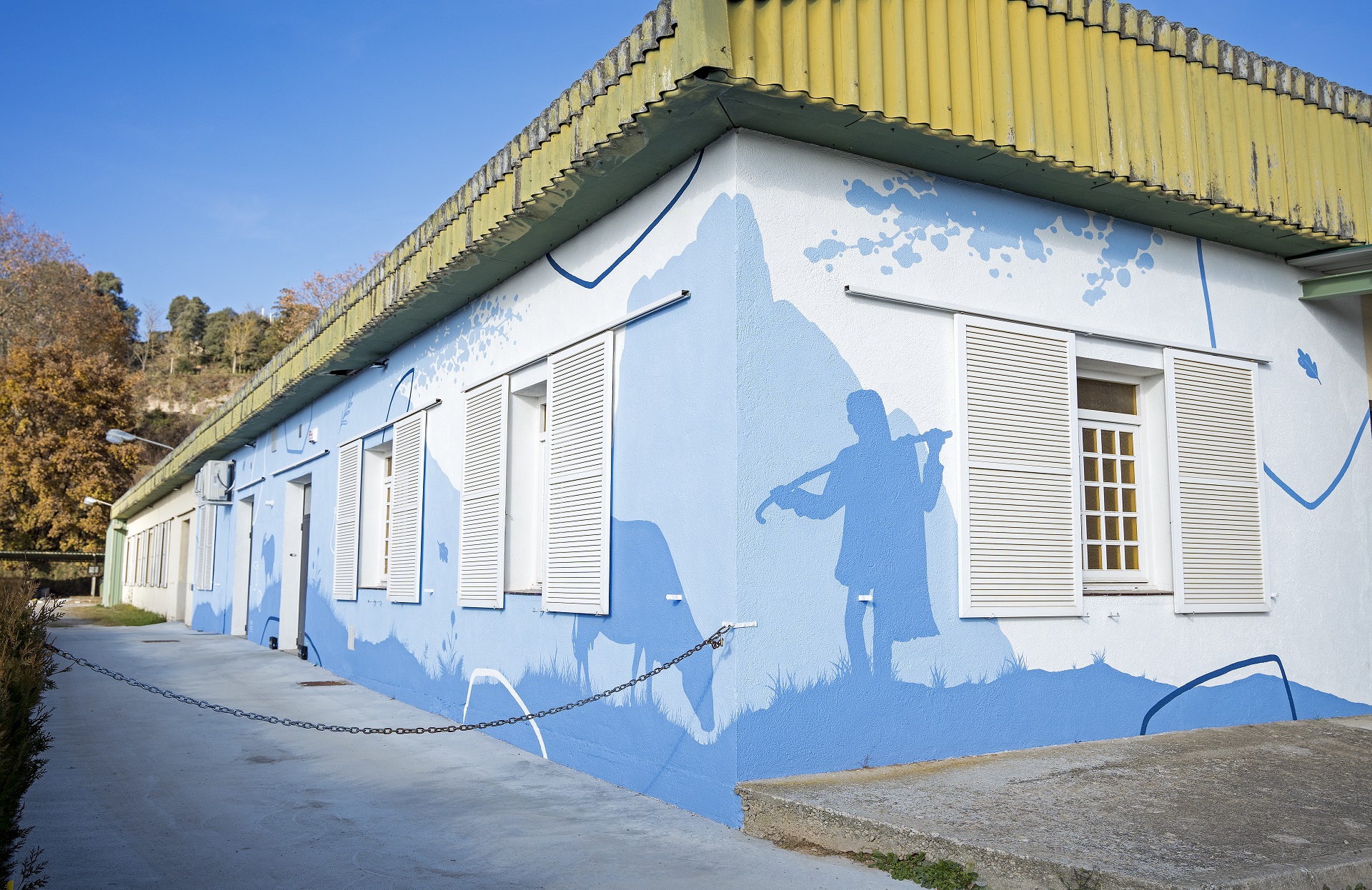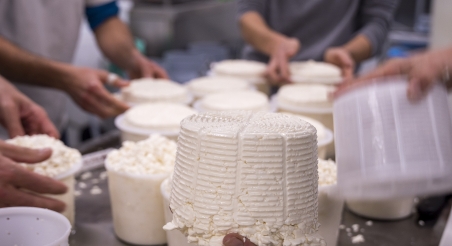Xavier Barniol Boixader's (Santa Eulàlia de Puig-oriol, 1979) first agricultural memory dates back to when he helped his father in the family vegetable garden. Much more recent is his interest in driving a change in the region's agri-food model, which only awakened when he started working in public administration.
From his position as the technical director of the Lluçanès Consortium, he has seen firsthand that public resources can be well invested in programs related to revitalizing rural areas. Now, he dedicates a significant part of his work to revitalizing traditional trades in the region. Developing agricultural and livestock activities in Lluçanès is one of his top priorities, as he made clear when, in the midst of the pandemic, he continued to lead with conviction and joy the process of creating Catalonia's first collective cheese dairy.
Xavier, first of all, congratulations for starting up the collective cheese dairy, an initiative within the BCN Smart Rural strategy and co-financed with FEDER funds. Where did the idea come from?
The idea comes from the need to have equipment ready to be able to carry out the practical part of the course for experts in the production of artisanal cheeses that we have been organizing for ten years from the Lluçanès Consortium. In each edition, we had difficulties finding a space and this endangered the continuity of the training. In addition, seeing the degree of self-employment generated by the course, we considered that creating a collective cheese factory was a strategic project for Lluçanès and the rural world, so we contacted the Association of Rural Initiatives of Catalonia (ARCA) and the Territorial Agrarian Directorate of the Barcelona Provincial Council to help us launch the initiative.
Considering the origins of the idea, it is perfect that the collective cheese dairy was able to open in June with the students of the cheese-making course. It is a very consolidated training, organized jointly with the University of Vic, and with the support of the Earth Products Network of the Barcelona Provincial Council. Do you think that organizing courses in collective and collaborative facilities can enrich the learning processes of the people interested?
Yes, in many different ways. Aside from educational enrichment, the collective workshops allow interested people to learn more about the facilities and machinery needed to professionally develop an agri-food project, and also generate awareness towards community spaces and col· laboratories
«The collective workshops allow interested people to learn more about the facilities and machinery needed to professionally develop an agri-food project» Xavier Barniol
What you say contributes to making the cheese factory a unique facility, since it is not only considered a space for professional training and learning a trade: it is also a fully equipped workshop that aspires to become a nursery for new agri-food entrepreneurs, as it will allow them to start their activity without having to face very high costs. When do you expect to welcome the first artisan cheese makers? How will you go about the selection process? What requirements must be met to be able to use the workshop?
It is planned that the workshop will be put into operation in the autumn and, in fact, at the moment we are in the middle of the process of drawing up and drafting all the necessary documentation, including the selection procedure of the producers. I can tell you ahead of time, however, that for an entrepreneur to be able to use the facilities, there will be minimum access requirements (training or work experience, insurance, health and legal requirements to market, responsible statements, etc.), and the presentation of an explanatory report of the business project will also be requested, which will be assessed using scoring criteria. In any case, the internal regulations will include all the conditions necessary to use the workshop and everything will be finalized with the signing of a contract.
The need to promote local agri-food systems is evident throughout the territory, but setting up a shared-use workshop is a long and complex process. Will you collaborate with other organizations and entities to publicize your equipment and contribute to the birth of new initiatives?
As I mentioned before, the workshop was born thanks to the BCN Smart Rural project, which through the Rural Equipa't action, is designing, building and accompanying the installation of other shared equipment for agri-food processing. This collaboration with the Barcelona Provincial Council and ARCA allows us to be in permanent contact with initiatives similar to ours or with coincident interests and needs, and, in these contacts, we are always looking for complicity and synergies. In addition, from the Lluçanès Consortium itself, we want the project to be empowered with exchanges, research projects and knowledge transfers, and we have already started conversations in this sense. We want the Lluçanès cheese dairy to be a project that goes beyond Lluçanès. We want to create a network.
«We want the Lluçanès cheese dairy to be a project that goes beyond Lluçanès. We want to create a network» Xavier Barniol
Do you have any strategy in mind to bring the producers of the workshop closer to the consumers of Lluçanès? Do you think there is enough interest in local artisanal cheeses in the territory?
In the second phase, the intention is that cheese producers, jointly or individually, can offer their products to consumers who live as close as possible. This happens to facilitate points of sale in the same space, participate in existing networks and initiatives in Lluçanès and promote good support from the workshop's managing body, which is the Consortium. Locally produced artisanal cheese is attracting more interest than ever. And this is demonstrated by the number of events, activities and business initiatives that have been born around it in recent years.
What role does education play in valuing local products? Do you think teaching children how cheese is made can help them understand the importance of local food?
From Lluçanès, we have been working on raising awareness for some time to promote the consumption of local products with educational actions. For example, with the promotion of bread, milk and truffle agri-food routes in schools, but also with the organization of workshops, support projects for school gardens, the publication of school diaries for all the students of Lluçanès of primary school where healthy habits are discussed and where the valorization of local products is included, etc. So the answer is yes: I think education is very important in learning to appreciate local products. In the specific case of artisanal cheese making by children, I think it is more important that they understand and appreciate where the milk comes from rather than show them the whole process.
«Education is very important to learn to appreciate local products» Xavier Barniol
What do you want to achieve with this workshop in the medium and long term? What impact would you like to have on the territory?
In the medium term, we want the cheese dairy to consolidate its two objectives. That is to say, we would like it to host different types of training around the dairy sector throughout the year, either our own or external courses, and to be at full operational capacity in terms of hosting entrepreneurial people. In the long term, we want the space to become a benchmark in shared equipment, especially in the dairy sector. We also aspire to establish links and collaborations with other initiatives, and for the workshop to generate a very positive economic impact on the territory. We would like milk and cheese producers to benefit from this.
The collective cheese dairy has been opened in Alpens, a municipality that, in recent years, has seen its population greatly reduced to below 300 inhabitants. In addition to shared workshops, what other equipment and public resources should small towns have to strengthen rural agri-food systems and ensure that neighbours stay?
Local or regional slaughterhouses, shared general workshops, joint machinery, joint contracting, etc. come to mind. But, in reality, all public initiatives that serve to strengthen agri-food systems serve to fix the population, generate jobs with added value and attract new inhabitants to the rural world.
— Lola Mayenco —




